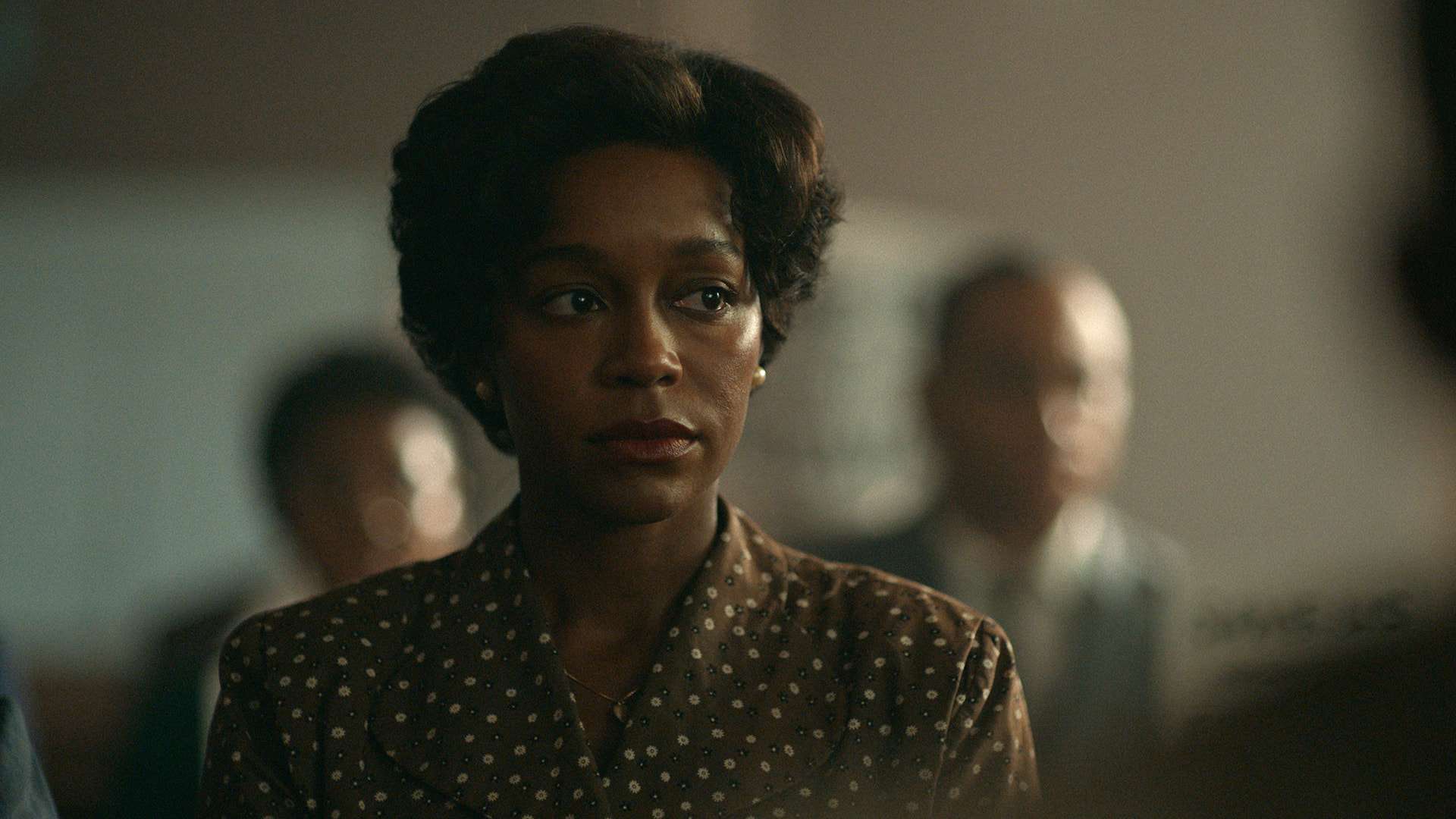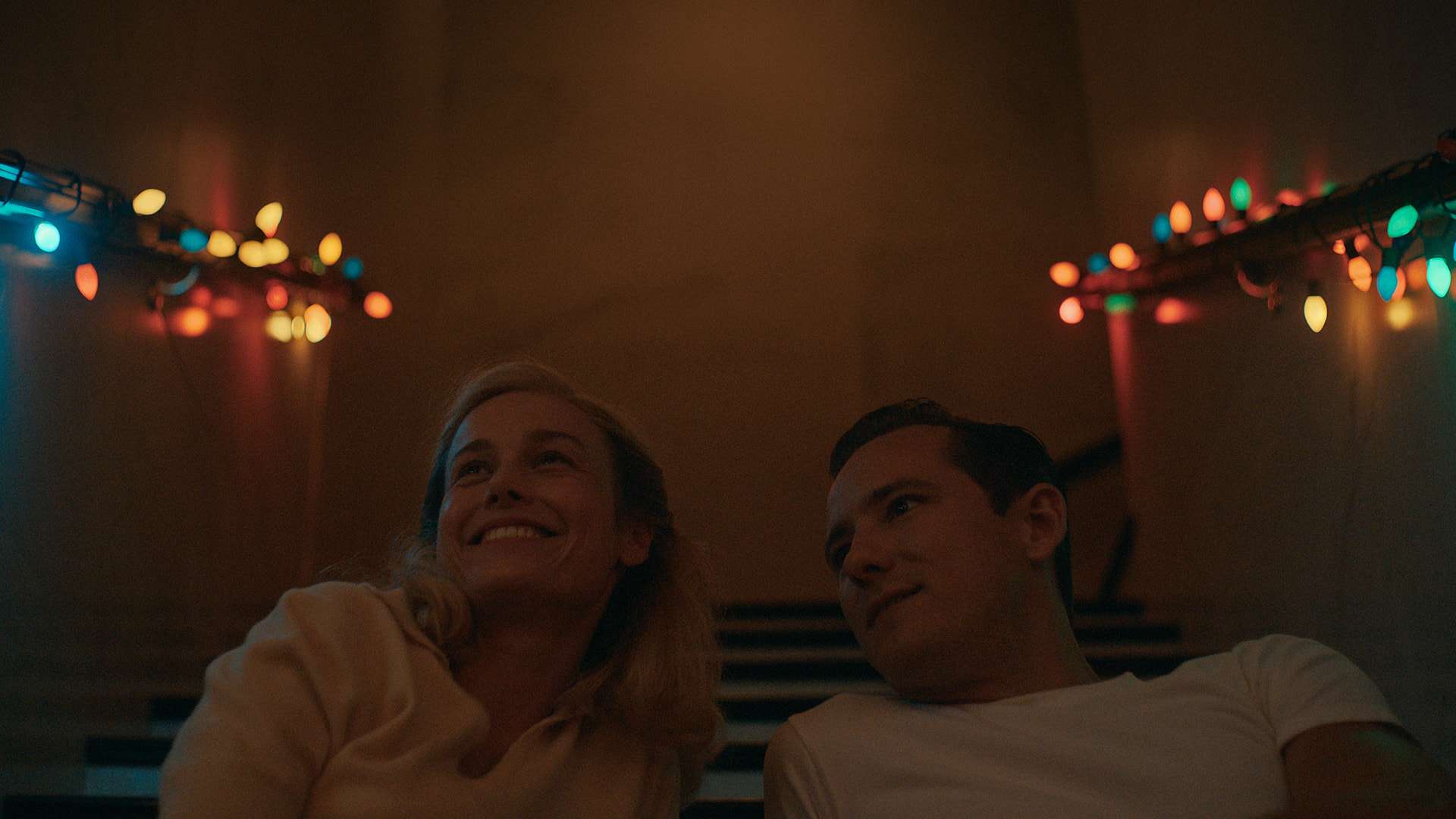Lessons in Chemistry (Season 1), Episodes 1 & 2: It is pretty hard to explain the feeling one gets when one sees a well-made pilot episode that gets the point across effectively enough without getting bogged down by the minutiae. Because it is a period piece with a prevalent message about women empowerment and misogyny prevalent in 50s academia and the larger society. Lessons in Chemistry, adapted by Lee Eisenberg, from the novel by Bonnie Garmus, puts forth the message through humor and subtle storytelling. As a result, it doesn’t come across as too preachy unless the scenes where Elizabeth Zott teaches about chemistry via cooking could be quantified as such.
Spoiler Alert!
Lessons in Chemistry (Season 1), Episodes 1 & 2 Recap:
Episode 1 – Little Miss Hastings
One can understand the merit of clever exposition in the first scene itself, which opens with Elizabeth Zott, now clearly famous as the gaggle of middle-aged women thronging her outside the live studio as any indication. As she walks in, she asks about the “sodium chloride” she had ordered, decides on the flavor of tomato she needs, and even acknowledges her manager, Walter, regarding opening with the sponsor “Presto,” a company selling canned goods. As Walter leaves her to go behind the booth, he leaves her with the parting shot, “Don’t forget to smile too much.” As the show “Supper at Six” goes live, we see Zott with her hair tied in a stylish bun but with a deadpan expression on her face as she opens her program by teaching about lasagna, but “with a new variable.”
It’s interesting how Zott takes the ad-lib written by her manager and flips it over, highlighting her wit. With the raucous reaction of the live audience, as well as the smirks of the women watching through the television, one realizes that this is the norm. Elizabeth Zott is no-nonsense, witty, and yet empathetic enough that she strikes a chord with “overlooked housewives” of all ethnicities in America if the notebooks being taken out are any indication. As she puts her pencil out of her bun and strikes it on the paper, the opening credits roll.
But who is this Elizabeth Zott, one might ask? And the show prefers to answer that by introducing another character after flashing back seven years. He is Dr. Calvin Evans (Lewis Pullman), the genius scientist with the cliched attitude of a man knowing full well of his brilliance and thus carrying with him a sense of entitled arrogance. He kayaks and runs the full road to his university, where he takes a bath at his lab. His superior, Dr. Donatti, knows all his idiosyncrasies but is content to let them slide for the time being because of the grant Evans is bringing to the university.
On the other hand, there is Elizabeth Zott (Brie Larson), a brilliant researcher with a Master’s in chemistry, but the only job she could hold at the laboratory that isn’t synonymous with the secretary is the post of a lab technician. But as Lessons in Chemistry shows, she is as proficient in her knowledge, if not more so, than her male peers currently doing their research. As we witness the proper avenues that she wants to pursue, we realize her issues.
These are never direct but rather insular in approach. She is pestered by the leader of the secretary group, herself the secretary of Dr. Donatti, Ms. Rask, who wants her to join the Little Miss Hastings Beauty Pageant. It is a culture where all the departments appoint secretaries to take part in a beauty pageant; the winner would get a cash prize. The questions that would be asked are mostly flimsy, while the women would be asked to partake in competitions that the men would judge regarding their capability of being good wives or the perfect competition.
As you can understand, this is not the most conducive setting for Zott herself. While she can fend off Rask’s pestering about her joining the pageant, Zott can’t find time to conduct her experiments in the laboratory while the male researchers are working on their experiments, and she is serving them coffee. Thus, she would be working off hours to continue her research on abiogenesis (the idea that life arose from non-living things more than 3.5 billion years ago). To continue her research, one night, she intends to use ribose sugar but finds her supply of ribose in the lab exhausted. Thus, she instead manages to open Dr. Ellis’s lab using her hairpin and take ribose from his stock. While in Evans’s lab, she looked at the disorganized pattern of the lab, with nuts and pieces of saltines on the table, while his instruments remain in pristine condition. However, Zott’s plan of working “overtime,” when it had been put on freeze by Donatti, came to a halt when Ms. Rask saw her working in the lab, unbeknownst to Zott.
The next morning, she is called to the head of the department’s office, where she is chastised and her accomplishments completely ignored. With her Master’s degree waving around in Hastings as the flag of authority, it isn’t enough to convince the ones at the top because she doesn’t have a Ph.D. The caveat, conveniently ignored, is that because of the sexual discrimination, which the Hastings Paegant, in a way, is an indication of, she would never have an opportunity within the annals of academia to proceed beyond her Master’s Degree. A secondary form of discrimination occurs when she is confronted in her lab by Dr. Evans, who accuses her of stealing the ribose and selling it on the black market. Evans is forced to eat humble pie, however, when, while complaining about the stolen ribose, he learns that Zott has a Master’s in Chemistry.

Thus, Evans does what any self-respecting male who could never even imagine apologizing for his outburst would do: he attends the paegant upon realizing that Zott is also taking part in the competition as Miss Amino. There, he is struck by Zott’s deadpan nature and nonchalance at refusing or even entertaining the trivial questions at the conference. While Zott has enough of being asked the inane questions and is silently chastised to smile more, Evans is unable to attend the pageant because of his allergies, which flare up due to Mrs. Donatti’s perfume, which contains formaldehyde. As a result, Evans almost vomits over Zott outside the pageant hall, and Zott takes pity on him and drives him home. While Zott comments on how spartan and untidy his home is, he tries to apologize to her and even asks why she hates him. Her answer reveals the complexity and subtlety of Elizabeth’s character, whereby she hates how because he is a man, successful and brilliant, his potential is fully realized, and his ideas have a receptacle to be heard, but he takes it for granted, while she has to claw her way through because they are never on equal ground. But Evans scores some brownie points with Elizabeth when he gifts the ribose for her experiment.
From there, the show slowly tries to blunt the acerbic nature of Evans, first by showing him babysitting his neighbor’s two young kids while she goes off to work and then protesting against the building of another flyover. When Evans asks why the government would allow such a thing to occur and let them be thrown out of their backyards, she points out that not everyone is being thrown out of their backyards, hinting not at all subtly that skin color holds an important factor in the decision-making process. The naivete might be unnecessary, but it does make Evans a bit more relatable. We then see him getting closer to Zott by having lunch with her and falling in love with her cooking while discussing both of their research and marveling at how she is utilizing the basic concepts of chemistry to experiment on different recipes and perfect the existing ones. As a result, Evans is impressed enough that he voices a proposition: they would work together. He would request Zott as his lab technician, but in the laboratory, they would be treated as equals, and when the time came for the paper to be published, Zott would be credited with lead authorship.
She agrees, but both of them face resistance from their superiors. Evans, because Donatti doesn’t believe that taking on a lab tech is necessary when he can hire any of the working researchers as his associate, while Zott is warned by Rask that a man and a woman can never be work partners or even remotely platonic without a man having an ulterior motive. Evans, on the other hand, again exercises his Remsen grant as leverage, to which his superior warns that once the grant runs out and Evans doesn’t follow through with his proposal, he will be fired.
Both of them do not reveal each of these opposing perspectives presented by their peers. Instead, both start working together through their significantly different working styles. He is untidy and able to keep track of all instruments where he left them earlier, while she likes to be orderly and regular. He adores jazz because of its unpredictability and prefers it to be loud while working; she, on the other hand, prefers her music to be rhythmic, with the volume significantly lowered. Thus, they both agree to alternate music every day.
However, a key barrier occurs when one day Evans has an epiphany regarding a breakthrough in her research, and he excitedly goes to Zott to talk about it, shutting the laboratory door in the process. We have seen flashes throughout the episode revealing Zott, possibly during her Master’s, having been locked in the X-ray crystallography room, probably by a man trying something untoward against her. Her personal space being violated is a deal-breaker for her, whereby he angrily stomps out of the lab, announcing to a confused Evans that this partnership had been a mistake and it is now over.
Episode 2 – Her and Him
As feared, the show flashes back to 1950s UCLA, where we see young Elizabeth submitting her final PhD proposal. While her dissertation is positively approved by her superiors, her path to the PhD gets permanently sidelined because she, in a moment of self-defence, attacked her guide while he tried to get cosy with her and almost sexually assaulted her. While Elizabeth managed to save her honor, her doctorate was permanently slammed shut because her guide shifted the blame for the entire events on her. Thus, the show makes it very clear how Elizabeth Zott is still working as a lab tech when her research and aptitude suggest far greater possibilities.
But the trauma caused by the event had caused her to unknowingly push Evans away, and while she couldn’t ask Rask to reassign her because her old post had already been filled, Rask wouldn’t reassign her because of her supposed “snobbish” nature and her refusal to listen to her warnings until she finally took decisive action. Thus, when Evans comes to the laboratory the following day, he finds the lab is divided into two halves (with a couple of centimeters left on her side to account for the body mass) by a yellow tape running through the middle of the room. Mistakenly thinking that whatever occurred is due to something he has initiated, Evans leaves the lab to her alone and stops coming to the laboratory.
Evans’s absence is leaving a toll on Donatti and the administration at Hastings, who want the Remsen funding to be renewed and thus, their star researcher to present his proposal. To ensure that action is expedited, Donatti is instructed, who in turn instructs Zott that Evans has three months to come up with a proposal regarding his work, after which he would be fired, and as Donatti proclaims, if Evans is unable to pull through with the Remsen project, layoffs would occur, especially for the female staff and lab technicians. Zott is cognizant enough to realize that Donatti is presenting a veiled threat, but her worry for Evans is what finally drives her to look for him in his house.

Upon reaching his house, Zott finds him furiously practicing rowing. Upon being questioned as to why he doesn’t design the university with his presence, Evans reveals that in the last two years, he has not accomplished anything substantial, and thus, he is currently out of ideas. The pressure from the administration isn’t helping matters either. But after meeting Zott, she renewed the spark within him because she had the vitality he had been missing—the spark of ideas tumbling forth. And thus, her decision to unceremoniously leave him only forced him to retreat to hell. Zott acknowledges that she misses working with him, to which he starts mending their relationship by trying to teach her to row.
That teaching ends in a disaster because while rowing is one of the most scientifically driven and accuracy-based sports, Zott had conveniently forgotten to reveal that she could swim. Later, as she reluctantly admits that the view is gorgeous, Evans reveals that he is developing strong feelings for her, which might prove antithetical to their working dynamics of professionalism and respect. Until she shuts him up by kissing him.
The majority of the episode showcases the burgeoning relationship developing as they grow closer, while Evans helps develop Zott’s thesis in a more positive direction. In return, Evans also tries cooking and has a candlelit dinner at their lab. The two of them decide to celebrate Christmas by working together. It is also revealed that the two of them don’t have anything remotely discerning as a family, thus slowly beginning to rely on each other as moral support. And as the chemistry between Lewis Pullman and Brie Larson shows, Zott and Evans fit together like two roughly textured gloves slowly smoothing against each other. Both Evans and Zott also develop a small family unit, with Evans asking Zott to move in, and she agrees with the caveat of making dinner three times a week and lunch for a day, with the rest allotted to Evans. Evans also adopts the stray dog of Zott, which she had, in her infinite wisdom, named “Six Thirty.”
However, while the relationship is developing into a small slice of heaven, the outside world and its responsibilities react differently. Because of Evans’s interest in Zott, he forgets to support his neighbor in her protest against the administration’s efforts to rehabilitate the colored members of the suburbs under the excuse of removing a “blighted” section of society. On the other hand, while Evans is the supportive partner and is very aggressive in ensuring that Zott gets lead authorship, the administration at Hastings is reticent.
The primary reason, according to them, is that the synthesis of nucleotides from scratch is nothing more than a cheap parlor trick because “DNA doesn’t have a future.” One wonders whether the show is a stealthy biopic or an homage to the forgotten member of the trio of scientists who discovered the existence of DNA, Rosalind Franklin. The real reason is their reticence to let a lab technician, that to a female, take lead authorship in a Remsen-funded project. While Zott proposes that she will remove her name from the paper if that would ensure the results are published, Evans emphatically refuses because while scientific progress is important to him, it is currently secondary to his feelings for her, and he knows she can’t deny them either. When she acknowledges the same, he posits that they will present their research independently, even though he does not have the faintest idea of how to go about doing it.
Lessons in Chemistry (Season 1), Episode 2 Ending Explained:
That night, after having written both of their papers, Zott and Evans finally delve into the conversation of having to share a life. Zott states that if Evans is thinking of “the old-fashioned way”, then she would have to refuse because she doesn’t want to marry or have children, even in the near future. When suggested by Evans of the same, she reminds him that his choosing to have Evans and start a family is still a choice that can be exercised because he has the freedom to return to academia whenever he wants. For a woman, having a child and having a family is equivalent to having the doors shut off from having a career. And he would be hard-pressed to disagree with her, especially seeing the misogyny she had experienced throughout the past episode and the current one. But Evans admits that he would support her decision so long as she would stay with him and be his partner.
But as the episode ends, it seems like their little slice of heaven is going to be smashed to smithereens. As Evans goes out on the run with their dog Six-Thirty, we see the dog hesitating to cross the street and even removing his neck from the leash that Zott had gifted to Evans. However, as Evans tries to cajole the dog to cross the road, a truck hits him. As the episode ends, we see the dog looking mournfully at the road. As the screen goes black, the credits roll, and we hear the passersby’s reaction that Evans is not moving.
More than the period setting, the uniqueness of the show is in the casting and the well-fleshed-out characters. Brie Larson is very proficient in playing characters with perpetually deadpan expressions, but there are moments where she manages to emote complex emotions beautifully. Her chemistry with Lewis Pullman is also believable, and thus, as we follow the life of Elizabeth Zott throughout this season, we realize that we should be witnesses to a series of unfair events and misogynistic nightmares that Zott would have to experience, but the show’s writing is smart enough that it wouldn’t completely wallow in that and become a misery fest. A strong current of humor plays beneath the sheen of the show, and that might be the primary reason why viewers will be intent on tuning in this very week. Also, because this is just a very well-written show.







![The Seventh Continent [1989]: A Critique on the Emptiness of a Quotidian Existence](https://79468c92.delivery.rocketcdn.me/wp-content/uploads/2016/08/The-Seventh-Continent-3-768x456.jpg)

![Movie Review: Euthanizer [2018]](https://79468c92.delivery.rocketcdn.me/wp-content/uploads/2018/07/Euthanizer-768x512.jpeg)